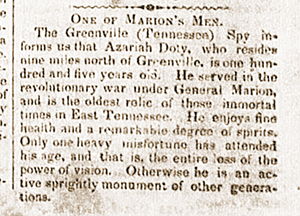State of Tennessee, Greene County.
September 1832
On the 5th day of September 1832 ...
Azariah Doty a resident of Greene County, Tennessee aged eighty‑seven years ...
that in the year 1775 he was a citizen of Burke County, North Carolina which was at that time a frontier county and lay under the mountain and was frequently annoyed by the Cherokee Indians and in consequence of which a portion of the citizens were left to save the frontier settlement,
that in the year 1775 he volunteered on the 1st of July and went under Sergeant Latham and Capt. Moon and scouted through Burke County to keep down the Tories and keep off the Indians and was kept in that employment first under one officer and then under another one and at other times employed not under any officer
until some time in October when the Indians turned their attention to some other section of country or at least became less troublesome to that neighborhood which service consisted of not less than three months he states that he received no written exchange for his service that he was only dismissed,
he states that he then moved to Washington County, North Carolina thats now Greene County, Tennessee where he has since resided,
he states that in September 1781 about the first of the month he was drafted to serve a three months tour to the South he was enrolled in Washington County then North Carolina now Greene County, Tennessee under Colonel Sevier, Capt. John Patterson, Sergeant Flippen and was marched to the Santee Swamp by way of Morgantown, ?, Camden, through the high hills of Santee to the Santee Swamp when he joined General Marion when a scouting party took some British prisoners and brought them to the swamp.
He states that Colonel Moon was also at that place with Marion. He states that his company was mustered, he states that he remained at that place until the term of three months had expired when they were discharged verbally and returned back to Washington then North Carolina after having served the full term of three months.
He states he was not in any battle during his tour, he states that he served frequent short tours after parties of Indians the summer following none of which was more than two weeks, one of which tours he volunteered under Capt. Wilson and was marched to French Broad River after the Cherokee Indians which tour was about one week,
shortly after he volunteered in Washington County as before under Capt. Wear and was marched to Little River now Blount County, Tennessee, and returned home and then was verbally discharged by the said Capt. Wear after having served a tour of two weeks and many other short tours he served.
He stated that he served in all ten months and three weeks during the War of the Revolution as above stated. He states he is a citizen of Greene County, Tennessee, he has no documentary evidence, and that he knows of no person whose testimony he can prove, who can testify to his service, he states there is no resident minister of the Gospel in his neighborhood.He hereby relinquishes every claim whatsoever to a pension or anuity except the present and declares that his name is not on the pension roll of the agency of any state.
Sworn to me and subscribed this day and year aforesaid.
Azariah X Doty



